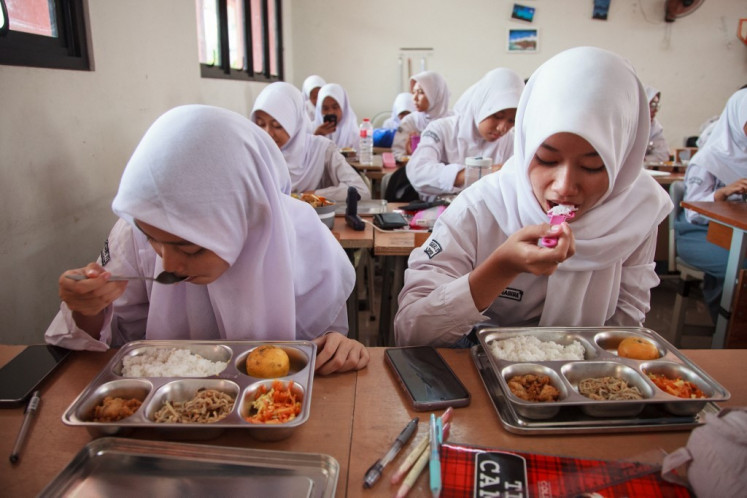Popular Reads
Top Results
Can't find what you're looking for?
View all search resultsPopular Reads
Top Results
Can't find what you're looking for?
View all search resultsCPO producers’ net earnings drop on lower prices
Falling commodity prices in the global market have impacted net profits of publicly listed palm oil companies during the first nine months of this year
Change text size
Gift Premium Articles
to Anyone
F
alling commodity prices in the global market have impacted net profits of publicly listed palm oil companies during the first nine months of this year.
PT Astra Agro Lestari (AALI), a subsidiary of conglomerate PT Astra International, posted a 10.1 percent decline in net profits to Rp 1.67 trillion (US$173.67 million) despite an increase in the company’s CPO production.
The firm’s CPO production rose 11.2 percent to 1.03 million tons between January and September compared to the same period last year. With higher volume, the company saw its net revenue grow 8 percent to Rp 8.57 trillion.
However, lower average selling prices and growing costs caused a decline in net profits, Astra Agro investor relations head Tofan Mahdi said.
The firm’s average selling price of CPO stood at Rp 7,739 per kilogram as of September, down 0.5 percent from the same period a year earlier. “Our price has been declining, in line with falling global commodity prices due to oversupply and the weakened European market,” Tofan said on Friday.
Costs of goods sold rose by 13.2 percent to Rp 5.55 trillion, while general and administrative expenses increased 22.1 percent to Rp 386.28 billion. Astra also reported a rise in its selling expenses, which climbed 31.1 percent to Rp 254.45 billion.
About 97 percent of Astra Agro’s CPO production is sold in Indonesia, with the rest exported to Singapore. Besides CPO, Astra Agro also produces fresh fruit bunches and kernel from its plantations in Kalimantan, Sulawesi and Sumatra.
Plantation companies PT Salim Ivomas Pratama (SIMP) and PT PP London Sumatra Indonesia (LSIP), part of the Salim Group business empire, also reported a decline in net profits in the third quarter.
Salim Ivomas’ net profits fell 24.2 percent to Rp 969.58 billion during the first nine months of 2012. Its net revenues grew slightly by 11.7 percent to Rp 10.52 trillion amid surging costs, including costs of goods sold which increased 21.7 percent to Rp 7.46 trillion.
Salim Ivomas’ CPO sales volume rose by 5.6 percent to 619,000 metric tons. However, its rubber sales volume only amounted to 12,000 metric tons, 11.8 percent lower than same period a year ago.
Contrary to Salim Ivomas’ achievements in net revenues, London Sumatra’s latest financial report shows that it suffered lower net revenues and higher costs.
The net revenues declined 4.3 percent to Rp 3.37 trillion, while the costs of goods sold climbed 17.8 percent to Rp 1.98 trillion. In the end, London Sumatra’s net profits slumped 27.6 percent to Rp 949.86 billion.
PT Indofood Sukses Makmur president and CEO Anthoni Salim said in a statement that weak commodity prices had affected the performance of both Salim Ivomas and London Sumatra. Indofood is the parent company of the
two firms.
Meanwhile, publicly listed PT Sampoerna Agro (SGRO) reported that its net profits dropped by more than half to Rp 226.94 billion in the first nine months of the year.
Sampoerna investor relations head Michael Kesuma confirmed that the lower commodity prices played a role in this year’s third quarter results. The company’s net sales also declined, down 14.5 percent to Rp 2.15 trillion.
As of September, Sampoerna’s average selling price of CPO stood at Rp 7,669 per kilogram, 0.3 percent lower than a year before. Between January and September this year, it produced 233,142 tons of CPO, a 14.3 percent decline from 2011.










